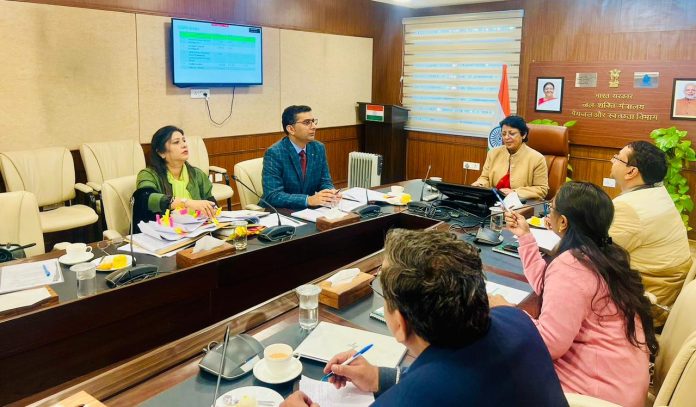NEW DELHI: The Department of Drinking Water and Sanitation (DoDWS), Union Ministry of Jal Shakti, approved the Annual Implementation Plan 2024-25 for Jammu and Kashmir under the Swachh Bharat Mission (SBM), in a meeting convened with the Department of Rural Development and Panchayati Raj J&K.
The Annual Implementation Plan was approved in the approval committee meeting chaired by Secretary DoDWS, Vini Mahajan was attend by Jt Secretary Jitendra Srivastava and other senior officers of the Union government. Dr Shahid Iqbal Choudhary, Secretary, Rural Development Department & Panchayati Raj J&K made a detailed presentation before the committee, along with Director General Rural Sanitation J&K Anoo Malhotra.
The annual plan outlay projected at Rs 365.42 Cr envisages creation of assets in rural areas for waste management, supporting the communities to operate and maintain the assets, coverage of tourist destinations, religious places and educational institutions. Major thrust of the plan will be establishment of operational Plastic Waste Management Units providing electricity supply, connectivity, waste collection support and detailed policy for use of shredded plastic in infrastructure projects, particularly road sector.
The department projected construction of 2000 community sanitary complexes covering the priority destinations and uncovered panchayats. Assets for solid waste management, gray water management, construction of biogas plants, sludge treatment plants, waste management facilities and community awareness are among the major initiatives approved under the SBM annual implementation plan. Efforts on sustainability of sanitation systems will be made under the AIP.
Dr Shahid Iqbal briefed about the need for coverage of population on remote areas, women centric initiatives, coverage of rural healthcare and educational institutions under the plan. He also raised the need providing sanitation facilities to the migratory tribal population in highland pastures, vulnerable populations and focusing on suburban areas for waste management facilities.
Mission Director SBM proposed construction of 21,000 IHHL units apart from coverage of all PMAY housing unit beneficiaries. Collection, storage & segregation centres, Vehicles for collection and transportation of waste, individual and community compost pits, segregation bins and safety material for sanitation workers are also included in the approved plan. Focus will also be placed on capacity building of village level committees and field staff.
Meanwhile, the department has asked Assistant Commissioners Development in all districts for inclusion of convergence with SBM under MGNREGA to create assets for solid waste management, plastic waste processing and disposal, and grey water management. Measures also planned for coverage of households in coordination with the Jal Jeevan Mission.
The Rural Sanitation department will also lay focus on developing material under IEC for community based initiatives aimed at sanitation, sustainability and waste management. Sanitation during Shri Amarnathji Yatra is also proposed under the SBM plan for current year. Community awareness and voluntary services are being promoted under SBM for sustainability.


